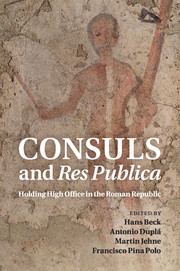Book contents
- Frontmatter
- Contents
- Preface
- Contributors
- The republic and its highest office: some introductory remarks on the Roman consulate
- Part I The creation of the consulship
- Part II Powers and functions of the consulship
- Part III Symbols, models, self-representation
- Chapter 8 The Roman republic as theatre of power: the consuls as leading actors
- Chapter 9 The consul(ar) as exemplum: Fabius Cunctator's paradoxical glory
- Chapter 10 The rise of the consular as a social type in the third and second centuries bc
- Chapter 11 Privata hospitia, beneficia publica? Consul(ar)s, local elite and Roman rule in Italy
- Part IV Ideology, confrontation and the end of the republican consulship
- Bibliography
- Index of persons
- Subject index
- References
Chapter 8 - The Roman republic as theatre of power: the consuls as leading actors
from Part III - Symbols, models, self-representation
Published online by Cambridge University Press: 07 September 2011
- Frontmatter
- Contents
- Preface
- Contributors
- The republic and its highest office: some introductory remarks on the Roman consulate
- Part I The creation of the consulship
- Part II Powers and functions of the consulship
- Part III Symbols, models, self-representation
- Chapter 8 The Roman republic as theatre of power: the consuls as leading actors
- Chapter 9 The consul(ar) as exemplum: Fabius Cunctator's paradoxical glory
- Chapter 10 The rise of the consular as a social type in the third and second centuries bc
- Chapter 11 Privata hospitia, beneficia publica? Consul(ar)s, local elite and Roman rule in Italy
- Part IV Ideology, confrontation and the end of the republican consulship
- Bibliography
- Index of persons
- Subject index
- References
Summary
How could communities,
Degrees in schools and brotherhoods in cities,
Peaceful commerce from dividable shores,
The primogenitive and due of birth,
Prerogative of age, crowns, sceptres, laurels,
But by degree, stand in authentic place?
Take but degree away, untune that string,
And, hark, what discord follows!
Shakespeare, Troilus and Cressida, i, 3, 105–12
Roman culture was always a culture of spectacles – in the concrete as well as abstract or metaphorical sense of the concept. To begin with, the religious calendar was packed with regular rituals and ceremonies, processions, games, festivals and other truly ‘spectacular’ occasions of all kinds – such as the run by the Luperci around the Palatine in mid-February and the carnival fight between Subura and Sacra via over the tail of the equus October (October Horse). The spectacular splendour of the ludi – in the late republic, the six most important of them, the ludi Romani, Apollinares, Megalenses, Plebei, Ceriales and Florales alone lasted for no less than 57 days every year – gave Livy reason to observe that by his own day this splendour had turned into utter craziness that would be hard to bear even for rich royalty. This culture revolved around, or was defined by, ‘spectacles’ as ‘ritualized performances that communicated, restored, consolidated, and sometimes helped change the communal order’ of the populus Romanus and their res publica.
- Type
- Chapter
- Information
- Consuls and Res PublicaHolding High Office in the Roman Republic, pp. 161 - 181Publisher: Cambridge University PressPrint publication year: 2011
References
- 21
- Cited by



